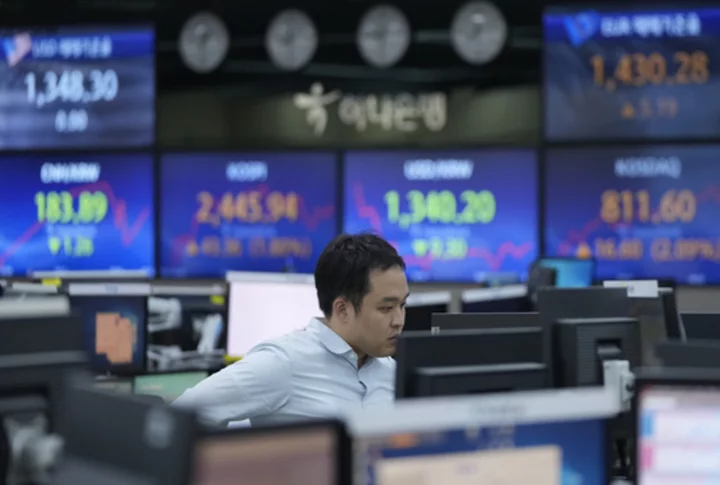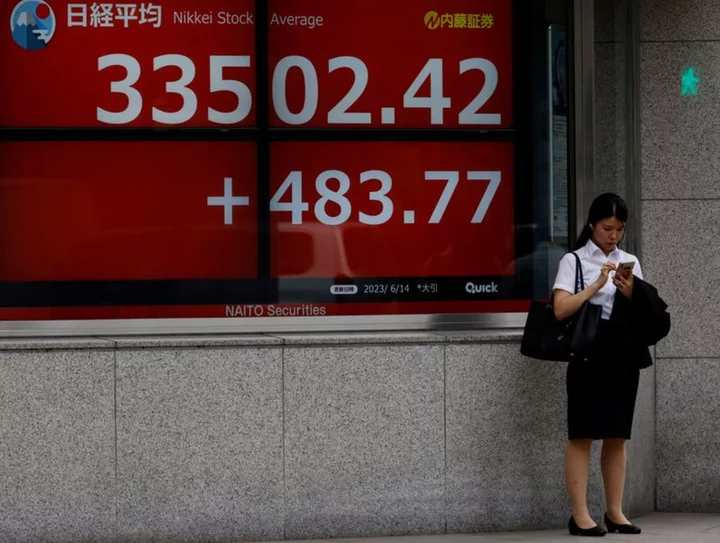BANGKOK (AP) — World shares and crude oil prices have slipped ahead of an update on the state of the U.S. economy in the last quarter.
U.S. futures also were lower.
Preliminary U.S. economic growth data for July-September are due later Thursday. The government is expected to report robust growth that highlights the durability of consumer and business spending despite the Federal Reserve’s efforts to cool the expansion.
High interest rates and bond yields are taking a toll on stocks and on the housing market, where mortgage rates have jumped to their highest levels since 2000. The Fed’s hope is to restrain the economy enough to cool inflation, but not so much that it creates a deep recession.
Uncertainty over the U.S. economic outlook, the war in the Middle East and other hazards is rippling through world markets.
Germany's DAX fell 1.4% to 14,681.30 and the CAC 40 in Paris shed 0.8% to 6,863.37. Britain's FTSE 100 was down 0.7% at 7,365.02.
The future for the S&P 500 dropped 0.6% and that for the Dow Jones Industrial Average was down 0.3%.
The yield on the 10-year Treasury has nudged back up toward 5%. It was at 4.97% early Thursday after dipping to 4.82% late Tuesday.
In Asian trading Thursday, Tokyo’s Nikkei 225 sank 2.1% to 30,601.78 and the Kospi in Seoul declined 2.7% to 2,299.08.
Hong Kong's Hang Seng lost 0.2% to 17,044.61, while the Shanghai Composite index bounced back from early losses, gaining 0.5% to 2,988.30.
Sydney's S&P/ASX 200 shed 0.6% to 6,812.30. In Bangkok, the SET sank 2.2%, while Taiwan's Taiex fell 1.7%.
Rapidly rising Treasury yields have been knocking the stock market lower since the summer. The 10-year yield has been catching up to the Federal Reserve’s main interest rate, which is above 5.25% and at its highest level since 2001 as the central bank tries to get inflation under control.
High yields whittle away at prices for stocks and other investments while slowing borrowing and adding pressure to the financial system. They tend to take the biggest toll on stocks seen as pricey or those requiring their investors to wait the longest for big growth.
In the oil market, U.S. benchmark crude oil sank $1.23 to $84.16 per barrel in electronic trading on the New York Mercantile Exchange. A barrel of U.S. crude rose $1.65 to settle at $85.39 on Wednesday.
Brent crude, the international standard, declined $1.23 to $87.89 per barrel. It jumped $2.06 to $90.13 per barrel on Wednesday.
U.S. oil surged above $93 last month, and it’s bounced up and down since then amid concerns that the latest Israel-Hamas war could lead to disruptions in supplies from Iran or other big oil-producing countries.
However, escalations in the conflict do not necessarily cause oil prices to surge. Prices fell Thursday even after Israeli troops and tanks launched an hourslong ground raid into northern Gaza overnight.
In currency dealings, the U.S. dollar climbed to 150.28 Japanese yen from 150.23 yen on expectations that Japan's central bank will not alter its longstanding near-zero interest rate stance at a policy meeting next week.
The gap between the minus 0.1% Japanese benchmark rate and much higher rates in the U.S. and elsewhere has driven the dollar's value sharply higher against the yen. To a certain extent, that's a boon for export manufacturers who register much higher profits in yen back home, but it undercuts the currency's purchasing power for imports.
The euro weakened to $1.0540 from $1.0568.









